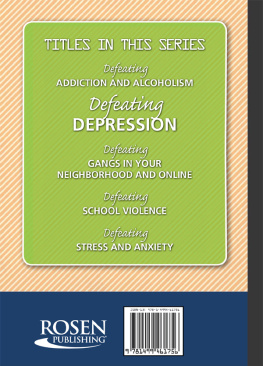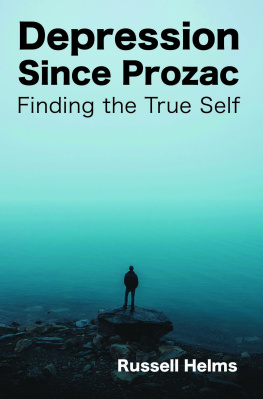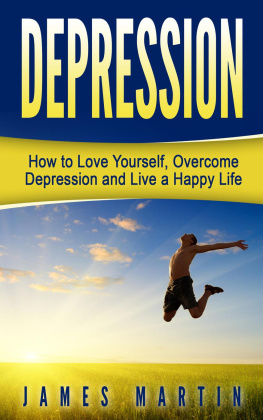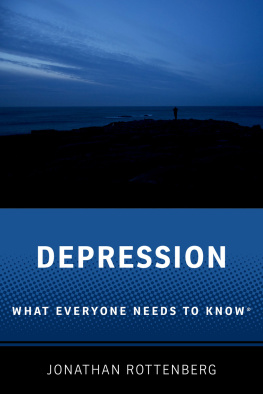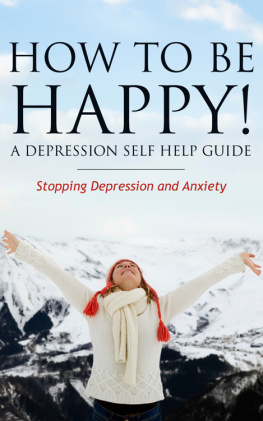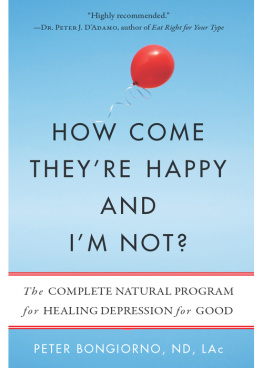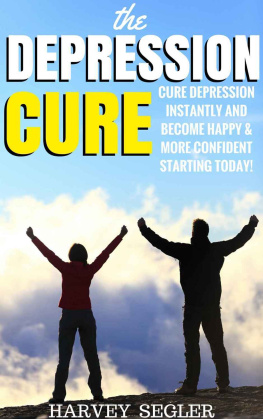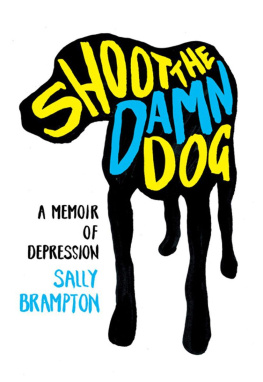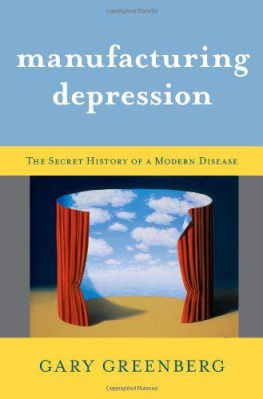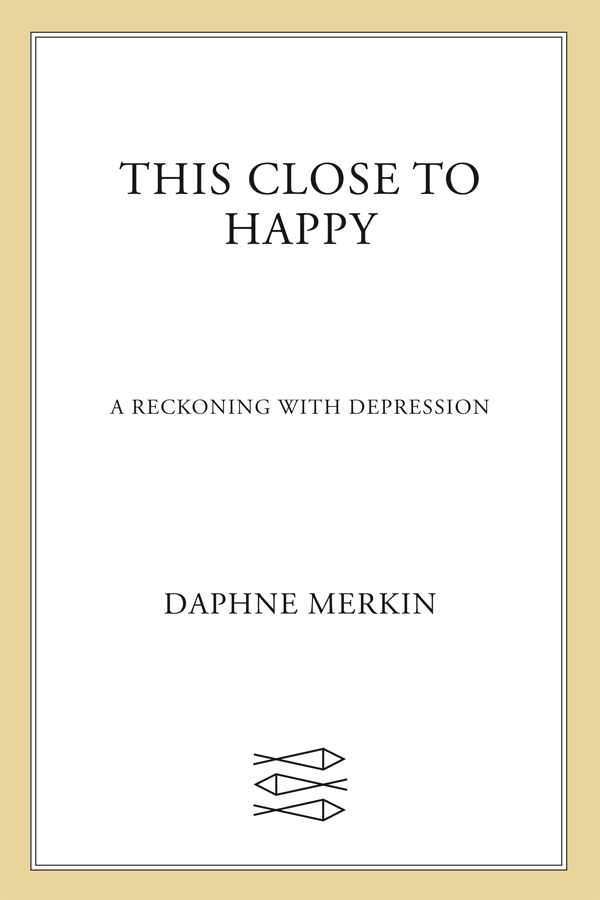Contents
Guide


The author and publisher have provided this e-book to you for your personal use only. You may not make this e-book publicly available in any way. Copyright infringement is against the law. If you believe the copy of this e-book you are reading infringes on the authors copyright, please notify the publisher at: us.macmillanusa.com/piracy.
To Michael Porder
Observe perpetually Observe my own despondency. By that means it becomes serviceable. Or so I hope.
The Diary of Virginia Woolf , Volume V
All my watercolors fade to black.
Annie Lennox, Pavement Cracks
Lately Ive been thinking about the allure of suicide againthe way it says basta! to life, like an Italian grandmother sweeping out all the accumulated debris of daily existence, leaving a clean and unmarked surface. No more rage at the circumstances that have brought you down. No more dread. No more going from day to day in a state of suspended animation, feeling tired around the eyesbehind them, tooand making conversation, hoping no one can tell whats going on inside. No more anguish, that roaring pain inside your head that feels physical but has no somatic correlation that can be addressed and treated with a Band-Aid or ointment or cast. Most of all, no more disguise , no more need to wear a mask: What, you, depressed? I never would have known.
They come on, such suicidally colored periods, at times like theseI am writing this in the winter, at my desk in New York Citywhen the days are short, evening starts early, the sky lacks light, and you have ceased admiring your own efforts to keep going. Although they can also come on when the day is long and the light never-fading, in early spring or ripest summer. They come on because your mood, which has been sliding perceptibly downward for weeks, even months, has hit rock-bottom. You lie there in the sludge, no longer bothering to flail around, marooned in a misery that is no less easy to bear because there is nothing wildly terrible to point to in the circumstances of your own lifeon the surface, at leastto account for it. And now this fatal tug has made itself felt again, suggesting an end to your despondency, your inability to get with the program, a phrase youve never liked in its brisk, gym-coach approach to what is after all a complex situationthis matter of your life and how much you want to submit to its termsbut all the same an apt one.
You have never understood the program, to be sure, what it is that you are meant to be propelling yourself toward, what long-term goal hovers before you that would suggest the possibility of a successful completion. There is, of course, the matter of your writing, a goal of a sort but also the impulse that keeps you going most reliably. Art is supposed to be long and life short, or so the Latin saying has it. Ars longa, vita brevis . But on a day like today, when everything seems gray and thin, nothing gives you ballast. You are too worn down to even pretend to know why you should put one foot after the other: it is life that seems too long, endless. A clock ticks somewhere in the silence of your apartment, empty second after empty second, reminding you that time hangs heavy when you have lost your way, like a vise around your neck. You are reminded as well of one of your stays on a psychiatric unit, when you sat in the so-called Day Room with some of the other patients and watched TV in the middle of the afternoon, something you would never have done at home and which made you feel entirely useless, like a piece of clothing hung out to dry and then forgotten about.
How ever did you fill your days before this torpor came and claimed you? It is difficult to recall how you once went naturally from one activity to the next, writing and reading, indulging in virtual window-shopping on the computer, talking to your daughter, laughing over something with a friend, warming up a cup of coffee or tea in the microwave. It wasnt as though you were ever exactly a dervish of energy, spinning from one hectically scheduled event to the nextyou are a stay-at-home sort at the best of times, someone who has to assemble the internal wherewithal to go out and meet people, no matter how open and receptive you seembut before, you didnt question the whole ongoing shebang of making plans. Now you can no longer figure out what it is that moves other people to bustle about out there in the world, doing errands, rushing to appointments, picking up a child from school. You have lost the thread that pulled the circumstances of your life together. Nothing adds up and all you can think about is the raw nerve of pain that your mind has becomeand, once again, how merciful it would be to yourself and others to extinguish this pain.
You might have become an addict, under different circumstances, retreating into the nullifying bliss of street drugs. Instead you take a prescribed regimen of legal drugs, tweaked occasionally by a well-meaning psychopharmacologist, and articulate your condition in fifty-minute sessions to people to whom you have paid large sums of money to listen to you over the years. You sit in their offices and discuss your wish to die the way other patients discuss their wish to find a lover. Never mind your daughter, your friends, your writing, the taste of something delicious, a new book, or the TV series everyone is watching: the things that are supposed to moor you to this world. Even those who know you best dont understand the glare bouncing off your eyes, the glare that prevents you from seeing up the road. Despair is always described as dull, when the truth is that despair has a light all its own, a lunar glow, the color of mottled silver.
A woman is standing in her kitchen, making a pot of coffee, spooning out the pungent overpriced ground beans from their snappy little aluminum bag into a paper filter, trying to remember what number tablespoon she was onfour? six? three?before the dark thoughts began tumbling in, doing their wild and wily gymnastics: You shouldnt, you should have, why are you, why arent you, theres no hope, its too late, its always been too late, give up, go back to bed, theres no hope, the day is half gone, no, the day ahead is too long, theres so much to do, theres not enough to do, everything is futile, there is no hope.
What, she wonders for the zillionth time, would it be like to be someone with a brighter take on things, with a more sustainable sense of the purposefulness of his or her existence? Someone possessed of the necessary illusionsthat things make sense and will work out for the better, especially if you cultivate your own gardenwithout which life is unbearable? Surely that person would be sticking with the coffee, not leapfrogging to suicidal desires at the first promptings of despair? What, that is, would it be like to be someone showered and dressed and more or less ready to face the day, not jumping for joy but not hobbled by gloom, either? For surely this is the worst part of being someone who is at the mercy of her own mind the way she is, pickled in the brine of self-hatred: the fact that there is no way out of the reality of being her, no relief in sight other than through forceful or at least conscientious interventiontalk therapy, medication, attempts at forward-march thinking, remembering the starving and the maimed and the generally less fortunateuntil shes up and standing and has hauled herself forward to that point of preparedness other people seem to arrive at with a naturalness of purpose that is utterly foreign to her.


